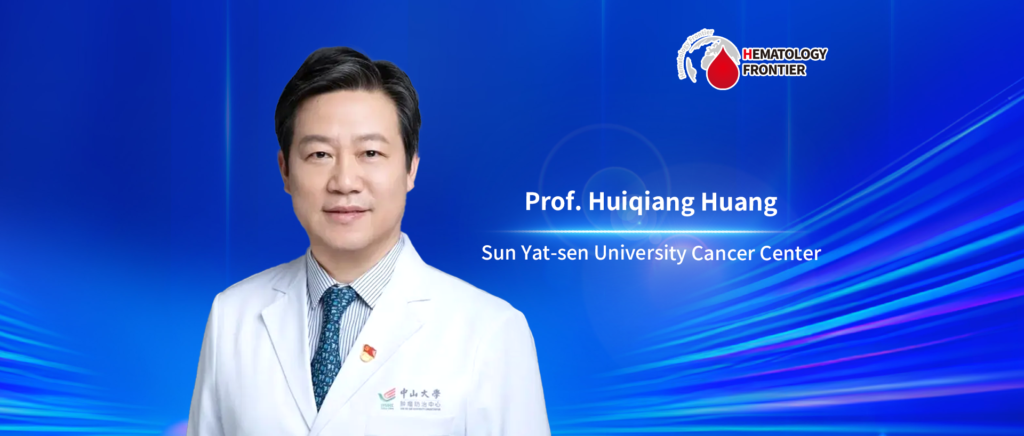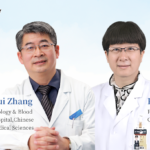
Editor's Note: From December 9 to December 12, 2023, the 65th American Society of Hematology Annual Meeting (ASH) took place in San Diego. Experts from around the world in the field of hematologic malignancies gathered, presenting a wealth of exciting content. During this conference, Professor Huang Huiqiang and his team from Sun Yat-sen University Cancer Center reported the long-term follow-up results of their phase Ib/II clinical study on the use of immune checkpoint inhibitor (PD-1) in combination with sintilimab for the treatment of relapsed/refractory extranodal NK/T-cell lymphoma. At the ASH conference, "Oncology Insight" had the privilege of inviting Prof. Huang Huiqiang to provide insights into this groundbreaking research.
PD-1 Antibody (Sintilimab) Plus Histone Deacetylase Inhibitor (Chidamide) for the Treatment of Refractory or Relapsed Extranodal Natural Killer/T Cell Lymphoma, Nasal Type (r/r ENKTL): Updates of the Phase Ib/II Scent Study
Hematology Frontier: Immune checkpoint inhibitors have become a crucial choice in cancer treatment. Could you share their applications in hematologic malignancies and the challenges they face?
Prof. Huang Huiqiang: I’m delighted to be interviewed by Hematology Frontier at the ASH conference. Three years after my last ASH attendance, the conference remains captivating, bringing together global experts in various subspecialties of hematology to share the latest research advancements. Immunotherapy is a significant exploration in lymphoma treatment, particularly in T-cell lymphomas. PD-1 inhibitors show remarkable efficacy in lymphoma immunotherapy, with favorable safety, cost-effectiveness, and accessibility for the Chinese population.
Currently, FDA, NMPA, and CFDA-approved indications for PD-1 inhibitors primarily involve relapsed/refractory Hodgkin lymphoma. In other subtypes, such as extranodal NK/T-cell lymphoma and angioimmunoblastic T-cell lymphoma (AITL), the efficacy of PD-1 monotherapy is limited. Enhancing efficacy while maintaining safety is the primary challenge for PD-1 monotherapy across various lymphoma subtypes.
Previous research indicates that combining PD-1 inhibitors with drugs of different mechanisms can synergistically enhance efficacy. Challenges lie in achieving increased efficacy while ensuring safety.
Hematology Frontier: The SCENT study is the world’s first research targeting relapsed/refractory extranodal NK/T-cell lymphoma using PD-1 inhibitors in combination with histone deacetylase inhibitors. Three years ago, your team reported preliminary results at ASH. What important updates are presented this time?
Prof. Huang Huiqiang: Our study aimed to investigate the efficacy and safety of combining PD-1 inhibitors with sintilimab for treating relapsed/refractory extranodal NK/T-cell lymphoma. At this year’s ASH conference, we presented the final results from the three-year long-term follow-up.
Due to higher PD-L1 expression in NK/T-cell lymphoma, PD-1 monotherapy demonstrates good efficacy but faces challenges of low complete response (CR) rates and short duration of response (DOR). Therefore, we applied the concept of epigenetic immunotherapy by combining PD-1 inhibitors with histone deacetylase inhibitors (HDAC).
Our study is a successful case of clinical progress in PD-1 inhibitors combined with epigenetic modulators. The synergy between sintilimab and PD-1 inhibitors has been widely studied. We screened 37 patients, all experiencing relapse/progression after multiple treatments. At this ASH conference, we reported the final follow-up results: an overall response rate (ORR) of 58%, with a CR rate close to 45%. This is a significant improvement for patients with relapsed/refractory disease, especially for CR patients who can achieve long-term disease-free survival. The median progression-free survival (PFS) exceeded 20 months, and the median overall survival (OS) reached 28 months, extending survival by 3-4 times compared to traditional treatment regimens. Our study is a successful exploration in the field of epigenetics, providing valuable insights for the treatment of other solid tumors. Multiple clinical trials initiated by our cancer center, using PD-1 inhibitors plus sintilimab as foundational drugs in combination with other targeted therapies, have shown encouraging results in colorectal cancer, among others.
This year, we observed a promising clinical study from Prof. King’s team in Korea: a chemo-free approach combining PD-1 and CD38 monoclonal antibodies for relapsed/refractory extranodal NK/T-cell lymphoma, achieving favorable outcomes. In 2021, we published an article on the use of CD38 monoclonal antibodies as monotherapy for extranodal NK/T-cell lymphoma. In a multicenter clinical study, we found that CD38 monotherapy had some efficacy, but due to low ORR and CR rates and notable toxicity, further exploration was limited. CD38 is a poor prognostic factor in extranodal NK/T-cell lymphoma, and this Korean study combining PD-1 with CD38 antibodies demonstrated a 65% ORR, 44% CR rate, and a median PFS of 21 months, showing excellent efficacy with manageable safety.
Since extranodal NK/T-cell lymphoma is rare in the West, solutions from Asia, especially China, can serve as references for Western researchers. Our approach is the preferred treatment for NKT patients without hemophagocytic syndrome and without B symptoms. Currently, we have extended this regimen to frontline treatment for newly diagnosed extranodal NK/T-cell lymphoma patients, using P-Gemox in sequence, and have achieved good results, which we look forward to sharing.
Hematology Frontier: The updated results suggest that the combination of sintilimab and pembrolizumab provides enduring efficacy and manageable toxicity for extranodal NK/T-cell lymphoma patients. What are the reasons behind this, and what clinical insights does it offer?
Prof. Huang Huiqiang: This is an excellent question, and many have wondered why the combination of PD-1 inhibitors and sintilimab, both commonly used in hematologic diseases, yields such good results. Multiple research results confirm various synergistic mechanisms when these two drugs are combined. For instance, sintilimab promotes PD-L1 upregulation, improves T-cell exhaustion, suppresses Treg cells, and activates NK cells, among other mechanisms. The unexpectedly long-lasting efficacy, overall safety, and favorable long-term follow-up results highlight the multiple synergistic mechanisms at play. Therefore, the field of epigenetic immunotherapy deserves continued attention and exploration.
Hematology Frontier: Finally, could you share any significant advancements in the diagnosis and treatment of extranodal NK/T-cell lymphoma (ENKL)?
Prof. Huang Huiqiang: Our SCENT study and Prof. King’s research have addressed clinical challenges for some patients, significantly improving survival for those achieving CR. However, challenges persist for patients without response (PR) or with disease progression (PD), those developing hemophagocytic syndrome, and those with evident B symptoms. For those where sintilimab and PD-1 inhibitors are ineffective, prognosis is poor. Currently, we are exploring other epigenetic drugs, mitoxantrone, and more in our center and other centers in China and Asia. We hope to continue in-depth research in both basic and clinical aspects to discover more effective solutions, especially Chinese strategies, to improve the prognosis of relapsed/refractory NKT lymphoma.

Prof. Huang Huiqiang
Chief Physician, Doctoral Supervisor, Professor
Associate Director, Department of Internal Medicine, Sun Yat-sen University Cancer Center
Chairman, Lymphoma Professional Committee, China Geriatric Health Association
Vice Chairman, Chinese Society of Clinical Oncology (CSCO) Lymphoma Alliance
Chairman, CSCO Thyroid Cancer Committee
Vice Chairman, Lymphoma Professional Committee, Chinese Anti-Cancer Association
Chairman, Youth Committee, Lymphoma Professional Committee, Chinese Anti-Cancer Association
Honorary Chairman, Hematologic Tumor Professional Committee, Guangdong Anti-Cancer Association
Vice Chairman, Hematologic Disease Professional Committee, Guangdong Society of Integrated Traditional Chinese and Western Medicine
Executive Committee Member, 2nd Hematologic Translational Medicine Professional Committee, Chinese Anti-Cancer Association


